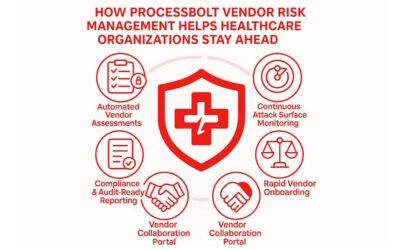The Case for Outsourcing Your Vendor Risk Management Program
The business ecosystem’s increasing interconnectivity with third-party suppliers and service providers amplifies the importance of effective vendor risk management. 60%+ of data breaches are related to third parties and the average cost of a data breach is $10.5MM.
This blog describes the escalating difficulties organizations encounter in vendor risk management and explores the strategic advantages of leveraging managed security service providers for this critical function.
Resource Constraints Make It Challenging to Effectively Manage Vendor Risk Internally
One of the main challenges of vendor risk management is the lack of resources. There is an acute shortage of cyber professionals and IT staff and teams often lack the resources to effectively manage vendor risk. This challenge is compounded by the fact that many organizations lack the subject matter expertise to navigate the increasing complexities of global data regulations, cybersecurity threats, and compliance obligations inherent in vendor relationships. Hiring a dedicated resource to manage vendor relationships can be expensive, and it can be much more cost-effective to outsource this function, allowing your team to focus on other key strategic priorities.
Regulatory Dynamics Are Amplifying the Importance of Effective Vendor Risk Management
Navigating the complexities of evolving regulatory standards is no easy task. With regulations like the General Data Protection Regulation (GDPR), and others like the California Consumer Privacy Act (CCPA) and Health Insurance Portability and Accountability Act (HIPAA), organizations are under immense pressure to ensure their vendor networks are compliant. The challenge is amplified by the evolving nature of these regulations, requiring companies to be agile in their compliance efforts. Non-compliance exposes businesses to legal penalties, including hefty fines, sanctions, and potential litigation, which can be financially debilitating. Furthermore, non-compliance can undermine a company’s reputation, eroding customer trust and confidence.
Managed service providers are equipped with the expertise to ensure that your organization fulfills the various compliance requirements associated with managing vendor relationships. They assist in proactive compliance, helping organizations avoid the pitfalls of reactionary regulatory measures, which can be costly.
Increasing Supply Chain Complexity Is Leading to More Exposure
The burgeoning complexity of global supply chains presents an escalating challenge for organizations in managing vendor risk. As companies engage with diverse suppliers and service providers, often spanning multiple countries, they broaden their attack surface and increase their exposure to potential cyber threats. This complexity is further intensified by geopolitical tensions, global health crises, and varying international trade regulations that add unpredictability to a business’s supply chain
Each additional vendor introduces a new set of variables into the risk equation, ranging from their cybersecurity protocols and data management practices to their geographical location and regulatory landscape. As organizations grow and their vendor networks become more complex, it can be challenging to allocate additional resources effectively to manage incremental exposure.
The Benefits of Outsourcing Your Vendor Risk Management Program
Given these challenges, it makes sense for businesses to consider outsourcing their vendor risk management to a managed service provider. A managed service provider can offer several benefits, such as:
– Expertise: A managed service provider has the knowledge and experience in vendor risk management, as well as access to the latest tools and technologies. They can provide a comprehensive and consistent assessment of the vendor risks and recommendations and solutions to mitigate them.
– Efficiency: Outsourcing the vendor risk management function can reduce the workload for internal teams and can allow them to focus on core business functions while ensuring that vendor risks are meticulously managed. Outsourcing this function can lead to substantial cost savings for businesses, eliminating the need to add additional resources. This approach also frees up resources, allowing companies to allocate their efforts and investments more strategically across other essential operations.
– Scalability: As the organization grows, or as new threats emerge, managed services providers can adjust the scope and scale of their services, ensuring that the company maintains robust risk management without the disruptions of scaling internal processes. This flexibility is critical in a rapidly evolving business landscape, where the ability to pivot and adapt can be a significant competitive advantage.
Get in touch today to learn about how ProcessBolt’s Vendor Risk Management as a Service offering can help your team more effectively and efficiently manage vendor risk.




